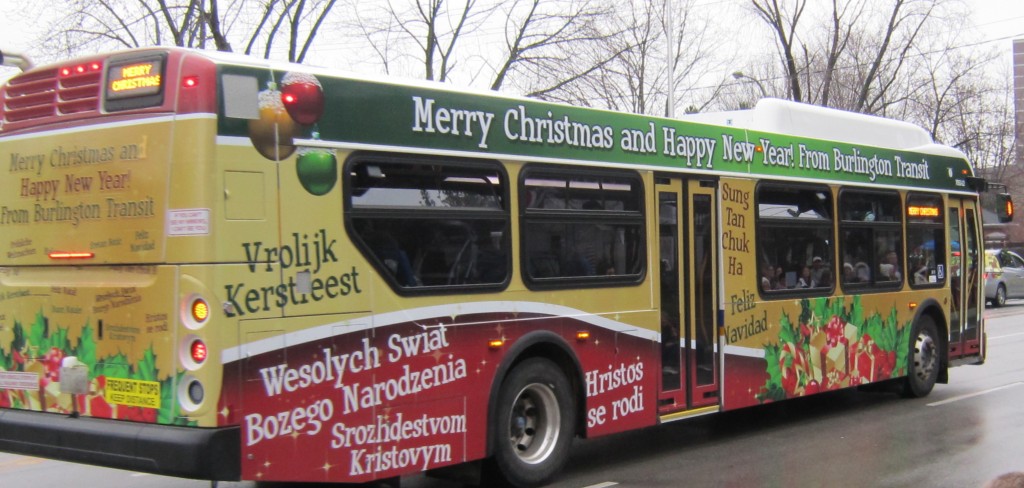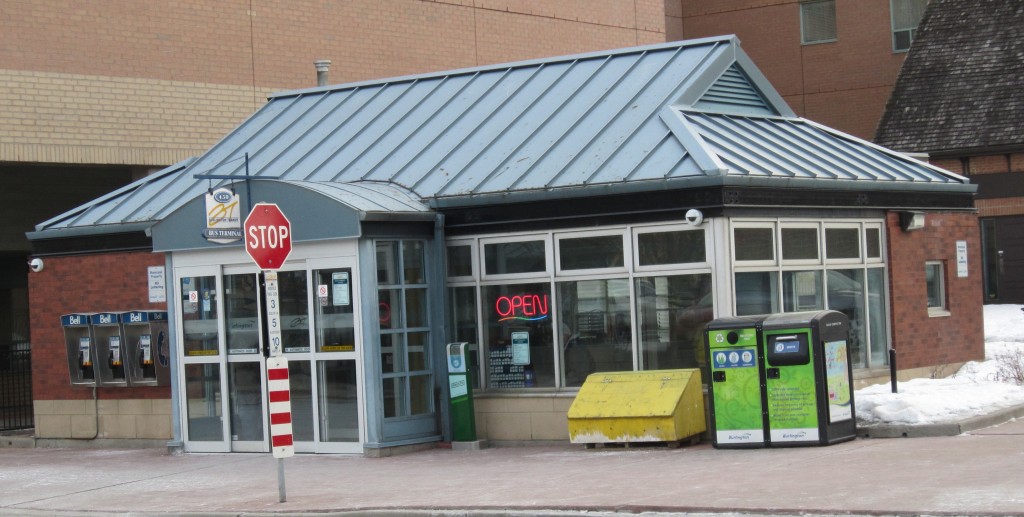 By Pepper Parr
By Pepper Parr
October 9, 2014
BURLINGTON, ON
Elections bring out all the interest groups. Many of these groups have taken to using questionnaires through which they solicit the views of the candidates on their issue and publish the results.
During this election it looks as if there are more than a dozen questionnaires in circulation. BurlingtonGreen has one, the Waterfront Advocacy group has one; the arts community has one, the Rural Burlington Greenbelt Coalition went one better and organized a tour of the damage they believe was done to north Burlington properties as a result of what they describe as illegal landfill dumping.

Doug Brown and Susan Lewis look over a 1982 copy of the city’s bus schedule.
Asked off the record every candidate will tell you that the questionnaires are getting a little out of hand.
BFAST, Burlington for Accessible Sustainable Transit, a local public transit advocacy group published the results of its first ever Municipal Election Candidate Questionnaire. The focus of the questionnaire was transit issues in the city, ranging from fares, to improving service levels, and providing a better quality of life to seniors and the disabled. The group was impressed overall with the quality of responses it received from candidates.
What was interesting with this survey was the number of incumbents who did not respond to the survey. Councillors Dennison, Sharman and Lancaster chose not to respond as did many of the candidates in ward six where the need for public transit in a newly developed community is important if younger people are to get out of the community without parents driving them around town.
In their media release BFAST said: “Clearly transit has resonated among candidates as a serious issue which the next term of council must address” said BFAST chair Doug Brown. “Many candidates comments agreed with the assessment of BFAST that Burlington has failed to meet the needs of transit users, and can do much more to attract new transit riders.”
A majority of candidates supported suggestions such as free transit for seniors one day a week, as Oakville has recently implemented. There is also widespread support among candidates for freezing or reducing fares, currently among the highest of any municipality in the GTHA. Criticism of the adhoc way in which transit service changes are implemented and communicated is also prevalent.
Here are some of the comments that stood out:
“It seems like we have worse transit now than we did when I was growing up in Burlington.”
“Having Transit Service Standards seem like a no-brainer, and to be honest, I didn’t know Burlington got rid of them… Thanks for bringing it to my attention.”
“When our City looks after its oldest, youngest and most vulnerable, we will all thrive.”

Burlington Transit put their most festive bus into the parade. The language doesn’t matter – the message is still the same.

Question 1: Burlington only spends one half of the GTA average on per capita municipal spending on transit, resulting in low service levels and low ridership.
Would you increase Burlington’s share of the transit operating budget to at least the GTA average?
Question 2: Burlington Transit’s capital budget has come from the City’s share of the Provincial Gas Tax Fund. Historically, Burlington had devoted 30% of their Federal Gas Tax monies to Burlington Transit. Most GTA cities allot a larger share of their gas tax funds to transit. For example, the City of Toronto allots 100% of their gas tax funding to transit. In 2013 and 2014, Council reduced the transit share of gas tax funding from 30% to 20%, removing $500,000 annually from the transit budget and using these funds to re-pave some side streets and cul-de-sacs.
Question 3: Although Burlington has one of the lowest transit service levels in the GTA. It leads the way on its fares. The $3.25 adult cash fare makes our fares among the highest in the GTA. For example, Hamilton cash fares are $2.55 (22% less than Burlington!). Even the TTC has a lower fare than Burlington.
Question 4: Transit Service Standards are used in most communities to ensure that their citizens have reasonable access to transit and good service. Transit Service Standards include maximum walking distances to transit from residences and major destinations, hours of service, and maximum wait times for transit users. Burlington had Transit Service Standards, but some years ago, quietly discarded their standards. This has resulted in many residents having little or no access to transit service, long waits between buses (one hour – mid-day – week days on North West routes), and long walks from their homes to a bus stop.
Question 5: Many of our citizens have mobility issues that prevent them from driving, or from using conventional transit. Burlington’s spending on special transit (handi-van and taxi scrip) has been well below the provincial average resulting in longer waits and poor service levels for special transit users. In addition, Burlington has cut funding for “taxi-scrip”, a program that enabled disabled passengers to take a taxi at an affordable rate if neither conventional nor special transit could meet their needs. The elimination of the Taxi Scrip Program has made it difficult in some situations for persons with mobility issues to attend urgent appointments or social events.
Question 6: The growth of transit use in Burlington will also need a considerable promotional effort and incentives to get drivers out of their cars and on to the bus. Reduced fares are a proven method of increasing ridership. For example, Oakville has increased the use of transit by seniors by providing free transit to seniors one day a week.
The responses are available online

Mobility hubs at the GO stations is close to a no brainer – it is the possible hub in the downtown core that has yet to be thoroughly thought through. Council decided that closing the terminal on John Street to save $8000 a year was not a bright idea.
There isn’t a consistently strong transit advocate on council other than Marianne Meed Ward who will press transit issues whenever she can.
When three of the seven incumbents choose not to respond to a serious survey and when the Transit Advisory Committee no longer functions – you know you are not in a transit friendly town.
And yet, when Council speaks of how it is going to improve a rather dismal record of economic development they talk of the creation of four mobility hubs in the city. Fitting public transit into the plans isn’t quite there yet. At one point Burlington Transit wanted to close down the ticket station in the downtown core.
The hope for transit as a public service might be the suggestion Mayoralty candidate Peter Rusin made when he said “transit should be a regional responsibility”. That would move transit policy development even further from the citizens. With an aging population that is getting bigger and bigger Burlington might find that voters will demand a service that meets their needs; that certainly isn’t the case today.



















“Asked off the record every candidate will tell you that the questionnaires are getting a little out of hand”
Sorry but if you can’t take the time to answer a few questions perhaps you shouldn’t be running for public office. This is one of the few ways the public has to hear from candidates on the issues, besides campaign material. Not everyone can attend debates, and that’s if there are even any being held – I have not heard about one in my Ward (3), and apparently there are none scheduled in Ward 5 either.
“When three of the seven incumbents choose not to respond to a serious survey and when the Transit Advisory Committee no longer functions – you know you are not in a transit friendly town.”
This is true… I’m running a similar survey on cycling infrastructure in Burlington (consisting of only 4 questions) and so far have received responses from only Rick Craven among the 7 incumbents and only 1 of 9 Ward 6 candidates.